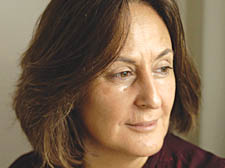|
|
 |
| |

Gillian Slovo: ‘the novelist has to look inside a character to make them real’ |
All in the mind: a novelist in an analyst’s arena
Gillian Slovo is opening her own psyche, as well as those of her fictional characters, at an unusual event tomorrow, writes Tom Foot
EVER since the arrival of psychoanalysis in this country its practitioners have struggled to overcome a social stigma.
Therapy has been regarded as the opium of the opulent, fragile hypochondriacs, or the downright bonkers. The public perception of the analyst ranges from the bespectacled chin-stroker Sigmund Freud to more recent incarnations like the television buffoon Dr Frasier Crane.
But there has been a change in recent years, in the government subconscious at least, with society increasingly demanding explanations for a wider range of irrational behaviour. Might the mystifying abuse of Baby P have been prevented had his parents been afforded psychiatric help? Could the knife and gun violence plaguing teenagers be addressed through cognitive behavioural therapy (CBT)? Or might our more day-to day-ailments be cured on the couch?
The Hampstead novelist Gillian Slovo, daughter of heroic South African Apartheid campaigners Ruth First and Joe Slovo, seems to thinks so.
She is set to appear in conversation with a leading psychoanalyst at an event designed to make psychoanalysis “accessible to a wider audience”. They will be casting a therapeutic eye over her latest work, Black Orchids, which spans 1940s Ceylon to modern-day Britain, tackling the most devastating irrational behaviour: racism.
“There has been a change, I think, in England in recent years,” Slovo says. “The perception of psychotherapy has shifted and is now seen less as something for the privileged and the mad. It is more a gambit for understanding and a way to help explain the complexities of modern life.
“The government in Great Britain has certainly recognised that CBT can help large numbers of people. It is also becoming clear that large numbers of patients visiting their doctors have problems that are not necessarily physical.”
She adds, as if to provide further evidence of their regularity, that “some of my best friends are therapists”.
One such friend is the psychoanalyst Valerie Sinason, who will be interviewing Slovo in the Institute of Psychoanalysis in Maida Vale tomorrow (Friday).
Sinason, a poet and psychoanalyst specialising in trauma and disability, is perhaps uniquely positioned for this conversation having already interviewed her about her work in a similar event three years ago – a discussion Slovo regards as one “about books and lives unlike any other”.
It is the understanding of the mindset of Slovo’s latest crop of characters, as well as the writer, that interests Ms Sinason – and not just the agonies of its two protagonists, but their oppressors too.
“Very few novelists can enter the hurt-lines of social and political trauma with an innate awareness of the truth of different subjectivities,” she says. “Slovo can provide us with compassion and understanding for those she would politically and personally have every reason to walk away from. In this, she displays the truth of Freud’s understanding of analytic neutrality.”
Slovo says: “I think the job of the novelist is not to make judgments on the psyche of a character – even in the ones you make up or even in somebody you dislike. You have to look inside to make them real. I suppose that is the job of a therapist too – I would like to hear what Valerie has to say about that.
“Valerie did an excellent job in getting at the sophistication and detail of what I am doing. It is a deeper understanding of the process, rather than the headlines.”
Headlines have run thick for Slovo, since her mother was murdered in 1982. She has written 11 novels since that time. Black Orchids begins in Ceylon, now Sri Lanka, in the 1940s.
“It is about a couple that fall in love but run in to difficulties,” she explains. “They come to England and have two children and the book is about their relationship and their children. It is an exploration about the move from the country you know, the sense of belonging, and what it is to feel at home in your own skin.”
While the characters will be under the microscope in tomorrow’s event, Slovo says she is becoming increasingly interested in settings.
“I have been to Sri Lanka, mainly to drink in the landscape, because that is becoming increasingly important to me,” she says. “Red Dust [2000] was set in the semi desert of South Africa; Ice Road [2004] in Leningrad. And now I am in the tropics and England. I used to write crime fiction. They were very interior. They were set in small rooms, homes; there was not much outside. I am increasingly finding myself drawn to writing about landscape. I suppose, as I get older, I am interested in the wider world.”
•
|

|
 |
|
 |
|

